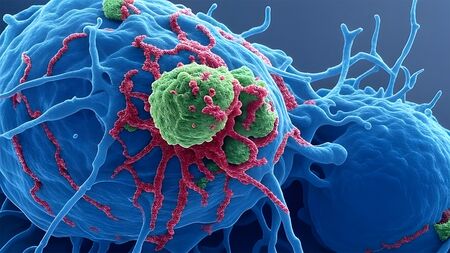Science
IIT Guwahati Develops Innovative Nanosensor to Detect Water Contaminants

Researchers at the Indian Institute of Technology Guwahati have unveiled a novel nanosensor capable of swiftly detecting harmful water contaminants, including mercury and tetracyclines, which are linked to serious health issues such as cancer. This breakthrough, reported on September 1, 2023, addresses a growing global concern regarding water pollution driven by urbanisation, industrial activities, and pharmaceutical overuse.
The innovative sensor is crafted from milk protein and thymine, demonstrating the potential of biogenic materials in environmental monitoring. Using carbon dots that emit fluorescence under ultraviolet light, the sensor provides a rapid and visible indication of contamination. When exposed to pollutants like mercury or tetracyclines, the fluorescence diminishes, alerting users to the presence of harmful substances even at low concentrations.
Significance of Detecting Water Contaminants
According to Prof. Lal Mohan Kundu, a member of the research team, “Detection of pollutants such as mercury and antibiotics is crucial, not only in water but also in biological fluids.” Mercury is known for its carcinogenic properties, while excessive antibiotics can lead to significant health risks, such as antibiotic resistance. Tetracyclines, a widely used class of antibiotics for treating pneumonia and respiratory infections, can contaminate water if not disposed of properly.
The health implications of contaminated water are severe. Organic mercury exposure can result in cancer, neurological disorders, cardiovascular diseases, and other life-threatening conditions. The need for accurate and prompt detection of such pollutants is essential for safeguarding water quality and public health.
Technical Innovation and Application
The research team detailed their findings in the journal Microchimica Acta, emphasizing the nanosensor’s design. The carbon dots, synthesized from affordable and biogenic precursor substances, showcase remarkable sensitivity. The sensor can detect mercury at concentrations as low as 5.3 nanomolar (approximately 1.7 parts per billion), surpassing the safety thresholds established by the United States Environmental Protection Agency. For tetracycline antibiotics, the sensor can identify concentrations as low as 10-13 nanomolar.
In laboratory tests, the sensor demonstrated its efficacy by registering a measurable dimming of fluorescence within 10 seconds upon contact with harmful contaminants. To enhance its practicality, the researchers integrated the sensor into simple paper strips, facilitating on-site testing for water contamination using an ultraviolet lamp. This development not only offers a cost-effective and accurate alternative to traditional water testing methods but also suggests potential applications in biomedical fields.
The research team highlights the importance of further validation before commercial rollout, aiming to ensure the sensor’s effectiveness across various environments, including tap water, river water, milk, urine, and serum samples. The implications of this research extend beyond environmental monitoring; the biocompatibility of the sensor opens doors for broader applications in health care and other fields.
As concerns about water quality and safety continue to rise globally, advancements such as this nanosensor from IIT Guwahati exemplify the critical role of innovation in addressing pressing health and environmental challenges.
-

 World4 months ago
World4 months agoSBI Announces QIP Floor Price at ₹811.05 Per Share
-

 Lifestyle4 months ago
Lifestyle4 months agoCept Unveils ₹3.1 Crore Urban Mobility Plan for Sustainable Growth
-

 Science3 months ago
Science3 months agoNew Blood Group Discovered in South Indian Woman at Rotary Centre
-

 World4 months ago
World4 months agoTorrential Rains Cause Flash Flooding in New York and New Jersey
-

 Sports3 months ago
Sports3 months agoBroad Advocates for Bowling Change Ahead of Final Test Against India
-

 Top Stories4 months ago
Top Stories4 months agoKonkani Cultural Organisation to Host Pearl Jubilee in Abu Dhabi
-

 Science4 months ago
Science4 months agoNothing Headphone 1 Review: A Bold Contender in Audio Design
-

 Top Stories4 months ago
Top Stories4 months agoAir India Crash Investigation Highlights Boeing Fuel Switch Concerns
-

 Sports3 months ago
Sports3 months agoCristian Totti Retires at 19: Pressure of Fame Takes Toll
-

 Business4 months ago
Business4 months agoIndian Stock Market Rebounds: Sensex and Nifty Rise After Four-Day Decline
-

 Politics4 months ago
Politics4 months agoAbandoned Doberman Finds New Home After Journey to Prague
-

 Top Stories4 months ago
Top Stories4 months agoPatna Bank Manager Abhishek Varun Found Dead in Well









